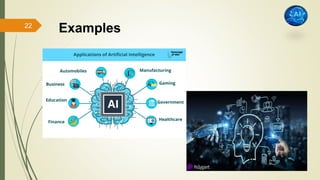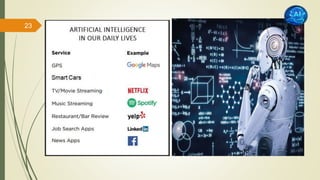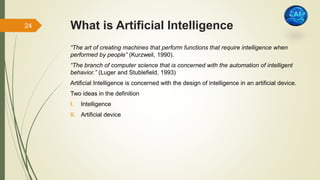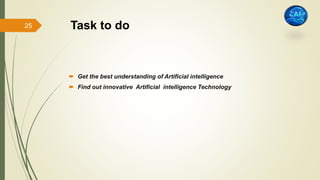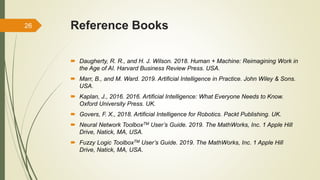Introduction to AI.pptx
- 1. Lecture 1 Introduction Instructor Waqas Ahmad Department of Computer Science University of Agriculture, Faisalabad Artificial Intelligence (CS-511) 1
- 2. ïīToday a Reader Tomorrow a Leader 2
- 3. Your feed back/Questions are most Welcome! ïą No Pain, No Gain _ no Magic ïą The More you Put in , The More you Get ïą Your grades are proportional to your efforts 3
- 4. SINGLE RULE OF SUCCESS Do not put off till tomorrow what you can do Today 4
- 5. Rules and Regulations ïī Come to the class on time with positive attitude. ïī Late comers (after 15 minutes) are not allowed. ïī Make sure you have more than 75% of attendance to sit in exams. ïī Pay full attention towards teacher during lecture. ïī Respect your self, classmates and teacher 5
- 6. 5 tips to Study ïī Donât Sit on Bed When you Study ïī No Music when you study ïī Donât Use Mobile (Social Media ) ïī Avoid People Around you ïī Donât Skip Pages Write 6
- 8. What is intelligent? ïī Many of you would exactly know what it is but most of you wonât exactly be able to define it. Is it something tangible? We all know that it does exist but what actually it is. TANGIBLE is capable of being perceived especially by the sense. ïī Let us try to understand the phenomena of intelligence by using a few examples. Consider the following image where a mouse is trying to search a maze in order to find its way from the bottom left to the piece of cheese in the top right corner 8
- 9. Intelligent Examples ïī This problem can be considered as a common real life problem which we deal with many times in our life, i.e. finding a path, may be to a university, to a friends house, to a market, or in this case to the piece of cheese. The mouse tries various paths as shown by arrows and can reach the cheese by more than one path. In other words the mouse can find more than one solutions to this problem. ï§ The mouse is intelligent enough to find a solution to the problem at hand. ï§Hence the ability of problem solving demonstrates intelligence. 9
- 10. The characteristic of intelligence comes in when we try to solve something, we check various ways to solve it, we check different combinations, and many other things to solve different problems. All this thinking, this memory manipulation capability, this numerical processing ability and a lot of other things add to ones intelligence. Example: Let us consider another problem. Consider the sequence of numbers below: 1, 3, 7, 13, 21, How will you solve? Again answering the question requires a little bit intelligence. The characteristic of intelligence comes in when we try to solve something, we check various ways to solve it, we check different combinations, and many other things to solve different problems. ï§All this thinking, this memory manipulation capability, this numerical processing ability and a lot of other things add to ones intelligence. 10
- 11. Case Study ïī All of you have experienced your college life. It was very easy for us to look at the timetable and go to the respective classes to attend them. Not even caring that how that time table was actually developed. In simple cases developing such a timetable is simple. But in cases where we have 100s of students studying in different classes, where we have only a few rooms and limited time to schedule all those classes. This gets tougher and tougher. The person who makes the timetable has to look into all the time schedule, availability of the teachers, availability of the rooms, and many other things to fit all the items correctly within a fixed span of time. He has to look into many expressions and thoughts like âIf room A is free AND teacher B is ready to take the class AND the students of the class are not studying any other course at that timeâ THEN âthe class can be scheduledâ. This is a fairly simple one, things get complex as we add more and more parameters e.g. if we were to consider that teacher B might teach more than one course and he might just prefer to teach in room C and many other things like that. The problem gets more and more complex. We are pretty much sure than none of us had ever realized the complexity through which our teachers go through while developing these schedules for our classes. However, like we know such time tables can be developed. All this information has to reside in the developerâs brain. 11
- 12. Findings of case study ïī His intelligence helps him to create such a schedule. Hence the ability to think, plan and schedule demonstrate intelligence. 12
- 13. Let us identify ïī Things are not all that simple. People donât think about problems in the same manner. Can you recognize a person just by looking at his/her fingerprint? Though we all know that every human has a distinct pattern of his/her fingerprint but just by looking at a fingerprint image a human generally canât just tell that this print must be of person XYZ. On the other hand having distinct fingerprint is really important information as it serves as a unique ID for all the humans in this world. 13
- 14. His intelligence helped him to learn the features that distinguish one finger print from the other. Hence the ability to learn and recognize demonstrates intelligence. 14
- 15. ïī A person goes to doctor, tells him that he is not feeling well. The doctor asks him a few questions to clarify the patientâs situation. The doctor takes a few measurements to check the physical status of the person. These measurements might just include the temperature (T), Blood Pressure (BP), Pulse Rate (PR) and things like that. For simplicity let us consider that some doctor only checks these measurements and tries to come up with a diagnosis for the disease. He takes these measurements and based on his previous knowledge he tries to diagnose the disease. His previous knowledge is based on rules like: âIf the patient has a high BP and normal T and normal PR then he is not wellâ. âIf only the BP is normal then what ever the other measurements may be the person should be healthyâ, and many such other rules. The key thing to notice is that by using such rules the doctor might classify a person to be healthy or ill and might as well prescribe different medicines to him using the information observed from the measurements according to his previous knowledge. 15
- 16. ïī Let us give one last thought and then will get to why we have discussed all this. A lot of us regularly watch television. ïī Consider that you switch off the volume of your TV set. If you are watching a Artificial intelligence lecture you will somehow perceive that the person standing in front of you is not singing a song, or anchoring a musical show or playing some sport. So just by observing the sequence of images of the person you are able to perceive meaningful information out of the video Your intelligence helped you to perceive and understand what was happening on the TV. Hence the ability to understand and perceive demonstrates intelligence. 16
- 17. ïī we all know that we answer such fuzzy questions very efficiently in our daily lives. Our intelligence actually helps us do this. Hence the ability to tackle ambiguous and fuzzy problems demonstrates intelligence. 17
- 18. Intelligent Machines ïī The discussion in the above section has a lot of consequences when we see it with a different perspective. Let us show you something really interesting now and hence informally define the field of Artificial Intelligence at the same time. ïī What if? ïī A machine searches through a mesh and finds a path? ïī A machine solves problems like the next number in the sequence? ïī A machine develops plans? ïī A machine diagnoses and prescribes? ïī A machine answers ambiguous questions? ïī A machine recognizes fingerprints? ïī A machine understands? ïī A machine perceives? ïī A machine does MANY MORE SUCH THINGS! ïī A machine behaves as HUMANS do? ïī We will have to call such a machine Intelligent. Is this real or natural intelligence? NO! This is Artificial Intelligence. 18
- 19. Artificial Intelligence ïī Artificial: Not Natural ïī Intelligence: âability to learn, understand and thinkâ. ïī AI is the study of how to make computers do things which, at the moment people do better(Rich,1991). ïī The power of a machine to copy intelligent human behavior. ïī Examples: Speech recognition, Facial Detection and Recognition, Text Editors or Autocorrect, Social Media, Learning new skills, Decision making, Abstract thinking. 19
- 20. 20
- 21. Father Of Artificial Intelligence ïī John McCarthy (born October 12, 1962) ïī American computer scientist and cognitive scientist. ïī McCarthy [25] has defined Artificial intelligence in 2007 as, âAI is the Science and Engineering of making Intelligent Machine, especially Computer Programsâ 21
- 22. Examples 22
- 23. 23
- 24. What is Artificial Intelligence âThe art of creating machines that perform functions that require intelligence when performed by peopleâ (Kurzweil, 1990). âThe branch of computer science that is concerned with the automation of intelligent behavior.â (Luger and Stublefield, 1993) Artificial Intelligence is concerned with the design of intelligence in an artificial device. Two ideas in the definition I. Intelligence II. Artificial device 24
- 25. Task to do ïī Get the best understanding of Artificial intelligence ïī Find out innovative Artificial intelligence Technology 25
- 26. Reference Books ïī Daugherty, R. R., and H. J. Wilson. 2018. Human + Machine: Reimagining Work in the Age of AI. Harvard Business Review Press. USA. ïī Marr, B., and M. Ward. 2019. Artificial Intelligence in Practice. John Wiley & Sons. USA. ïī Kaplan, J., 2016. 2016. Artificial Intelligence: What Everyone Needs to Know. Oxford University Press. UK. ïī Govers, F. X., 2018. Artificial Intelligence for Robotics. Packt Publishing. UK. ïī Neural Network ToolboxTM Userâs Guide. 2019. The MathWorks, Inc. 1 Apple Hill Drive, Natick, MA, USA. ïī Fuzzy Logic ToolboxTM Userâs Guide. 2019. The MathWorks, Inc. 1 Apple Hill Drive, Natick, MA, USA. 26
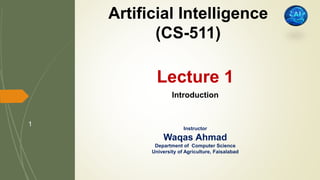



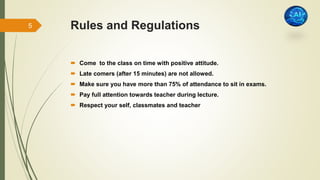
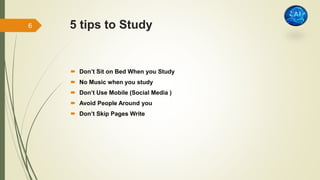
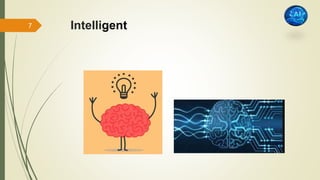
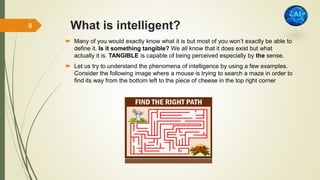
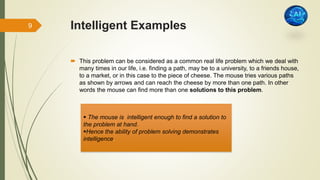
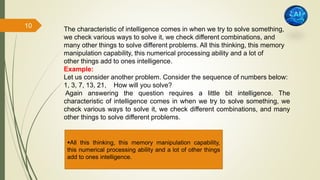

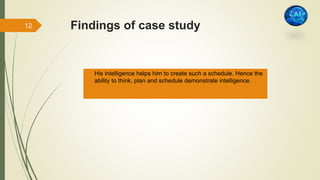
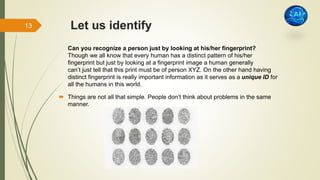
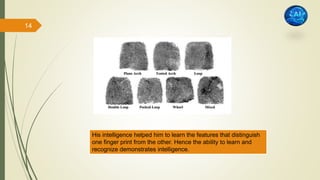

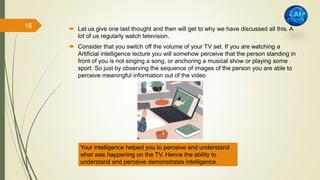
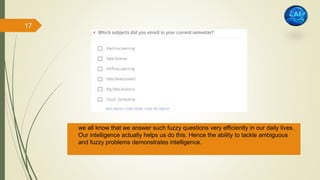
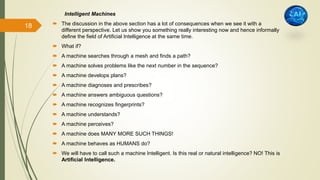
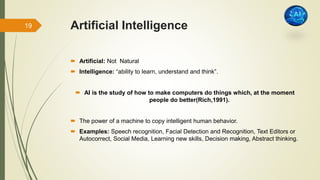
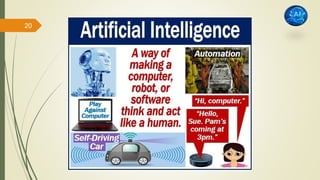
![Father Of Artificial Intelligence
ïī John McCarthy (born October 12, 1962)
ïī American computer scientist and cognitive scientist.
ïī McCarthy [25] has defined Artificial intelligence in 2007 as,
âAI is the Science and Engineering of making Intelligent Machine, especially
Computer Programsâ
21](https://image.slidesharecdn.com/1stlectureai-231004034920-ddf2c0fe/85/Introduction-to-AI-pptx-21-320.jpg)
